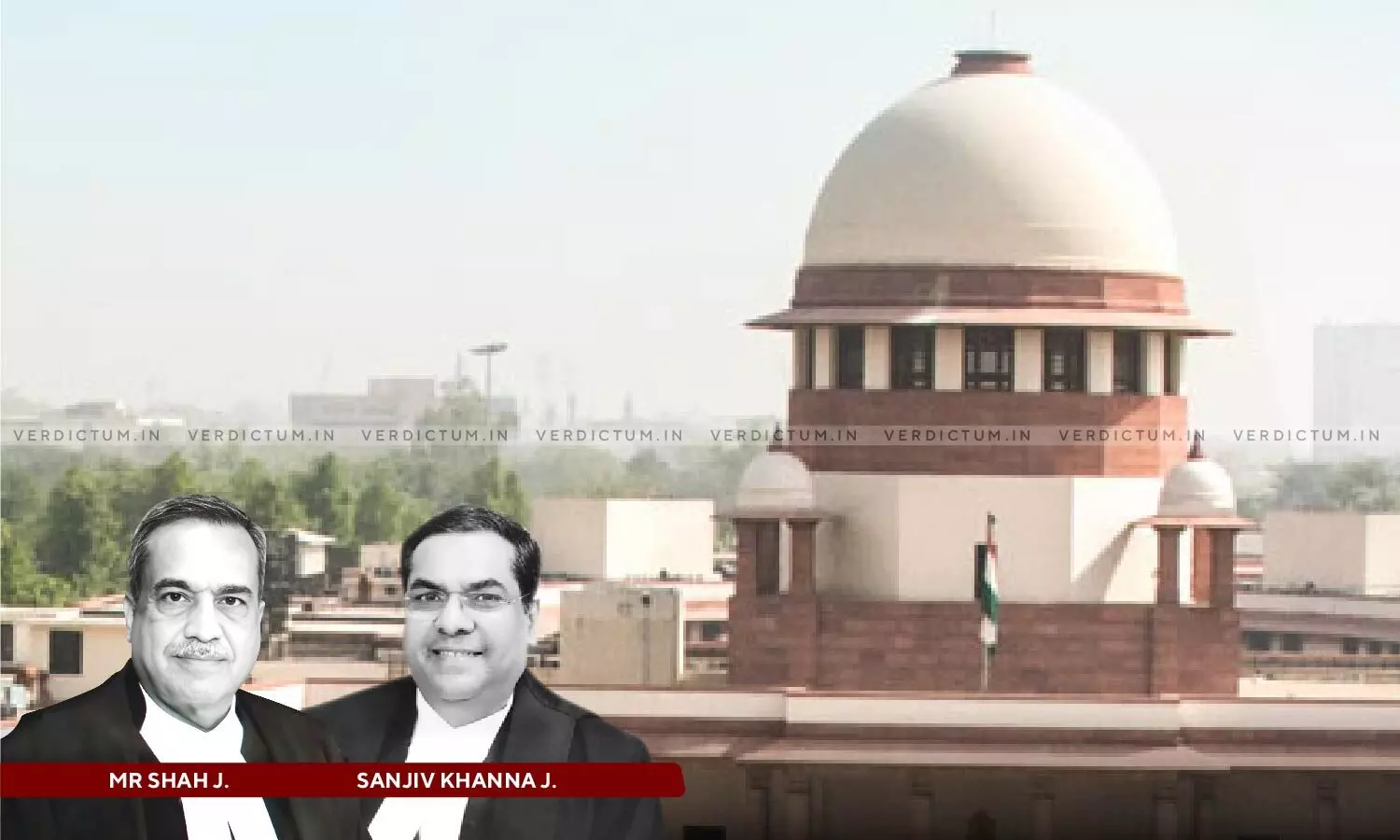
Section 327(7) Of Companies Act Is Not Violative Of Article 21: SC While Clarifying Over Liquidation Process Under IBC
 |
|The Supreme Court recently observed that Section 326 of the Companies Act, 2013 deals with overriding preferential payments which have to be paid in priority to all other debts, and these include the workmen debts, and dues of the secured creditor where the secured creditor has realized the secured asset but could not realize the entire amount, or the amount of workmen’s portion in his security payable under the law, whichever is less, pari-passu with the workmen’s dues.
Therefore, observing that Sections 326 and 327 of the Companies Act, 2013 shall not be applicable in the event of liquidation under the IBC, and it applies with respect to the liquidation of a company under the IBC, a Two Judge Bench of Justice M.R Shah and Justice Sanjiv Khanna held that "Section 327(7) of the Act, 2013 cannot be said to be arbitrary and/or violative of Article 21 of the Constitution of India".
"In case of the liquidation of a company under the IBC, the distribution of the assets shall have to be made as per Section 53 of the IBC subject to Section 36(4) of the IBC, in case of liquidation of company under IBC", added the Bench.
Senior Advocate K.V. Viswanathan appeared as Amicus Curiae and Senior Advocate Gopal Sankaranarayanan appeared for the Petitioners. On the other hand, ASG Balbir Singh appeared for the Respondent.
In a nutshell, the Petitioners i.e., Moser Baer Karamchari Union had approached the Court seeking declaration of Clause 19(a) of the Eleventh Schedule of the IBC pursuant Section 255 of the IBC, as violative of Article 14 of the Constitution, as Clause 19(a) of the Eleventh Schedule of the IBC inserts sub-section (7) in Section 327 of the Companies Act, 2013, which puts statutory bar on the application of Sections 326 and 327 of the Companies Act, 2013, to the liquidation proceedings under the IBC.
The Petitioners also sought for declaration of sub-section (7) of Section 327 of the Companies Act, 2013, as violative of Article 14 of the Constitution, as sub-section (7) of Section 327 of the Companies Act, 2013, which was inserted in Section 327 of the Companies Act, 2013 pursuant to Section 255 and the Eleventh Schedule of the Insolvency and Bankruptcy Code, 2016, Act 31 of 2016, creates unreasonable classification for the distribution of legitimate dues of workmen in the event of liquidation of the Company under the IBC and liquidation of Company under the provisions of the Companies Act, 2013.
Further, the Petitioners had pleaded that distribution of the workmen's due as envisaged under Section 53(1)(b)(i) of the IBC, be declared as violative of Article 14 of the Constitution, as Section 53(1)(b)(i) of the IBC limits the workmen's dues payable to workmen to twenty-four months only preceding the date of order of Liquidation and then rank the said workmen's dues equally with the secured creditors in the events such secured creditors has relinquished security in the manner set out in Section 52 of the IBC.
After considering the submissions, the Apex Court noted that Sub-Section (7) of Section 327 of which the vires is under challenge, shall be applicable in case of liquidation of a company under the IBC.
Thus, the Apex Court clarified that in case of liquidation of a company under IBC, the provisions of Section 53 of the IBC and other provisions of the IBC shall be applicable as the company is ordered to be liquidated or wound up under the provisions of IBC.
“Therefore, merely because under the earlier regime and in case of winding up of a company under the Act, 1956/2013, the dues of the workmen may have pari passu with that of the secured creditor, the petitioner cannot claim the same benefit in case of winding up/liquidation of the company under IBC”, added the Court.
The Bench went on to observe that as per Section 36(4) of IBC, all sums due to any workman or employee from the provident fund, the pension fund, and the gratuity fund shall not be included in the liquidation estate assets and shall not be used for the recovery in the liquidation, and therefore, the same cannot be said to be arbitrary and violative of Article 21 of the Constitution of India as contended on behalf of the Petitioner.
Finding that the reasons and grounds for winding up under Section 271 of the Companies Act, 2013 are vastly different from the reasons and grounds for the revival and rehabilitation scheme as envisaged under IBC and they cannot be equated for examining whether there is discrimination or violation of Article 14 of the Constitution, the Bench highlighted that, “Companies Act, 2013 does not deal with insolvency and bankruptcy when the companies are unable to pay their debts or the aspects relating to the revival and rehabilitation of the companies and their winding up if revival and rehabilitation is not possible. In principle, it cannot be doubted that the cases of revival or winding up of the company on the ground of insolvency and inability to pay debts are different from cases where companies are wound up under Section 271 of the Companies Act 2013”.
Accordingly, the Apex Court dismissed the petition.
Cause Title: Moser Baer Karamchari Union and Ors. v. Union of India and Ors.